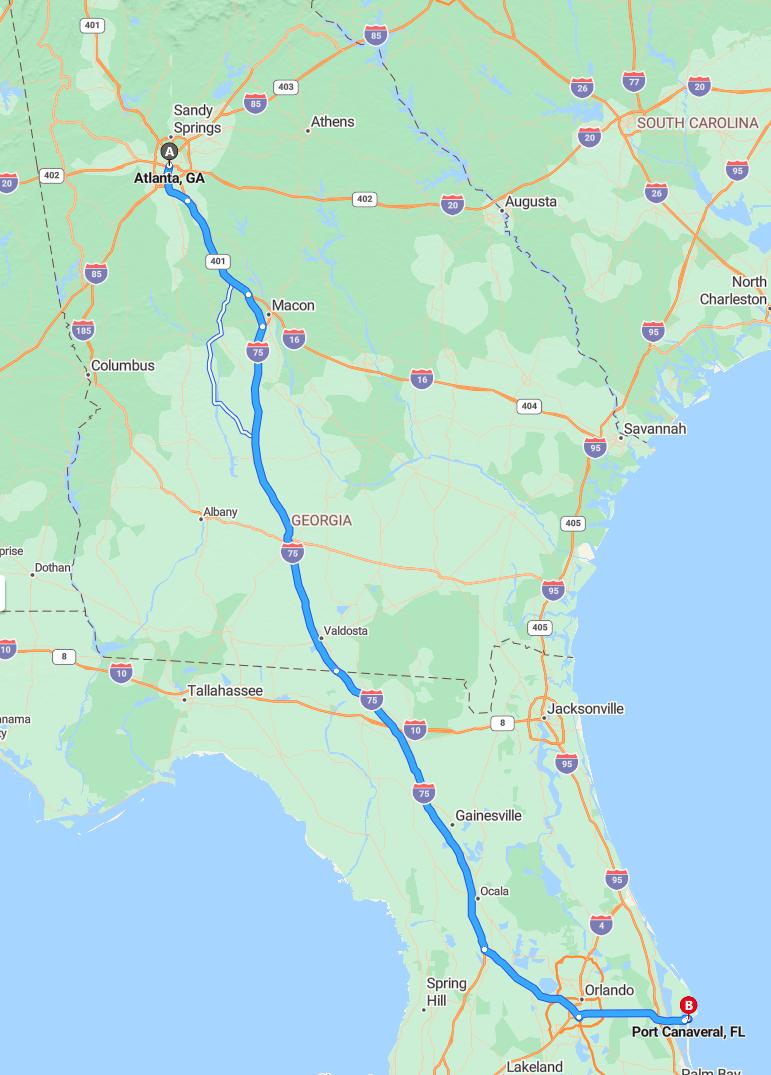Distance and estimated driving time
The drive from Atlanta to Port Canaveral covers approximately 492 miles and takes around 6 hours and 45 minutes, depending on traffic conditions. The most common route involves traveling south on I-75 S, followed by FL-91 S to reach your destination. This scenic and straightforward journey offers a convenient way to explore Florida's coastal regions. Ensuring your vehicle is prepared for the trip can help guarantee a smooth and enjoyable experience.
Driving route
Embarking on a road trip from Atlanta to Port Canaveral presents a diverse journey through vibrant cities and scenic landscapes. Starting in Atlanta, travelers can enjoy the city's rich history and modern attractions before heading south to Macon, known for its musical heritage. Continuing the drive, Valdosta offers warm Southern hospitality and charming small-town vibes, followed by Gainesville's lush parks and educational institutions. As the route progresses to Orlando, visitors can indulge in world-renowned theme parks and entertainment options, culminating in Port Canaveral's stunning coastal views and marine activities. This scenic route combines urban exploration with natural beauty, making it an ideal journey for adventurers and leisure seekers alike.

Best time to drive for minimal traffic
The best time to drive from Atlanta to Port Canaveral for minimal traffic is during weekday mornings, ideally between 9:00 am and 11:00 am, when most commuters have already cleared the highways. Avoid peak rush hours in Atlanta (7:00 am to 9:00 am) and around Orlando (4:00 pm to 7:00 pm), as these times tend to have heavy congestion. Traveling on weekdays also helps bypass the typical weekend tourist crowds, especially near major destinations like Orlando and Port Canaveral. Planning your route during these off-peak hours can significantly reduce travel time and provide a smoother, more enjoyable journey.
Key landmarks along the route
As you journey from Atlanta to Port Canaveral, you'll encounter notable landmarks such as the historic Macon National Historic District, home to architectural gems and the Allman Brothers Band Museum. In Valdosta, the Valdosta State University and the Lowndes County Courthouse stand out as significant local attractions. Gainesville offers the University of Florida campus and the Florida Museum of Natural History, enriching your cultural experience. Approaching Orlando and Port Canaveral, visitors can enjoy landmarks like Walt Disney World and Cape Canaveral Space Force Station, making the trip both scenic and historically significant.
Recommended stopover locations
For an enjoyable road trip from Atlanta to Port Canaveral, consider stopping in Macon, which offers a rich musical and historical atmosphere, perfect for a quick explore. Valdosta provides a relaxing break with its pleasant parks and local eateries, ideal for stretching your legs. Gainesville is another excellent stop, featuring vibrant arts and outdoor activities at its university and parks. Finally, Orlando offers numerous attractions and dining options, making it an ideal place to rest before reaching your final destination at Port Canaveral.
Vehicle preparation tips for the trip
Before embarking on your road trip from Atlanta to Port Canaveral, it's essential to prepare your vehicle for a smooth journey. Check tire pressure and tread depth to ensure safety and fuel efficiency, and top off all fluid levels, including oil, coolant, and windshield washer fluid. Inspect brakes, lights, and belts to confirm they are functioning properly, and consider scheduling a quick maintenance check if needed. Additionally, pack an emergency kit, including snacks, water, a first aid kit, and any necessary tools, to stay prepared for any unexpected situations along the route.
Traffic conditions and route updates
Traveling from Atlanta to Port Canaveral, drivers should stay informed about current traffic conditions and route updates to ensure a smooth journey. The route, passing through Macon, Valdosta, Gainesville, and Orlando, can experience varying levels of congestion, particularly near major cities and during peak travel times. It is advisable to check real-time traffic reports before departure and along the route to identify any construction, accidents, or delays. Planning alternate routes and allowing extra time can help travelers navigate unexpected disruptions and reach their destination efficiently.
Fuel stations and amenities on the way
Traveling from Atlanta to Port Canaveral offers numerous fuel stations and amenities along the route to ensure a comfortable journey. In Macon and Valdosta, travelers can find well-maintained gas stations such as Shell, BP, and Exxon, often accompanied by convenience stores for snacks and refreshments. Gainesville and Orlando provide a wider range of amenities, including fast-food outlets, restrooms, and charging stations for electric vehicles. Near Port Canaveral, various service stations and local eateries are available, making it convenient for travelers to take breaks and refresh before reaching their destination.
Weather forecast during travel period
During your road trip from Atlanta to Port Canaveral, travelers can typically expect mild and variable weather conditions throughout the journey. In Atlanta and Macon, spring-like temperatures with occasional showers are common, so carrying rain gear is advisable. As you approach Valdosta and Gainesville, the weather tends to become warmer and more humid, with a slight chance of thunderstorms in the late afternoons. Upon reaching Orlando and Port Canaveral, you can anticipate warm, sunny days, ideal for outdoor activities, though brief localized thunderstorms may occur, especially during the summer months.
Safety precautions for long-distance driving
When undertaking a long-distance drive from Atlanta to Port Canaveral, safety precautions are essential to ensure a smooth journey. Prior to departure, perform a thorough vehicle inspection, including checking tire pressure, oil levels, and brakes, to prevent breakdowns. During the trip, take regular breaks every two hours to rest, stretch, and stay alert, reducing the risk of fatigue-related accidents. Additionally, stay attentive to weather conditions and traffic updates, and avoid distracted driving by refraining from using mobile devices while on the road.
